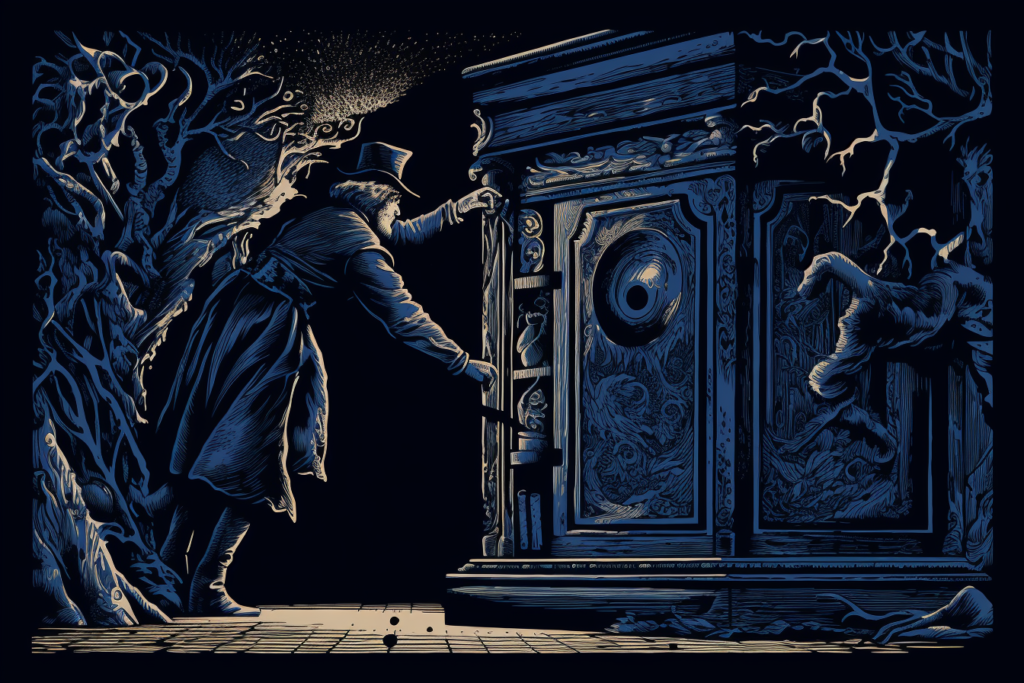
Locurio –
19 N 35th St, Seattle, WA 98103 –
(206) 371-2835
Type: Technical Awe: 6/10 Care: 9/10 Challenge: 7/10 Teamwork: 7/10 Theme: 7/10
One of the older rooms at Locurio, Vanishing Act has a familiar storyline, presented in a familiar way (especially if you remember Madeline Khan’s dialogue from Clue).
WADSWORTH: Your husband disappeared.
MRS. WHITE: That was his job, he was an illusionist.
WADSWORTH: But he never reappeared.
MRS. WHITE: He wasn’t a very good illusionist.
The disappearance of Noximillian the Magician’s ill-fated assistants wouldn’t be so disquieting, except that Noximillian’s show does not include a vanishing act. So what happened?
That’s the premise, and at this point, a couple of questions spring to everybody’s mind, and are just as quickly dismissed. The first is: Why are the players here? If it’s a murder mystery, isn’t it a matter for the authorities? No one needs an answer to that, obviously. The answer is “because escape room”. The other question is: Why are there puzzles here? Most designers, and many players, consider that second question equally unimportant, because the degree to which that second question impacts the coherence of the room is difficult to perceive.
The venue told us why we were there, in a prologue delivered by a talented actor. It felt a little long, and a little awkward (as live performers often do in escape rooms). Less effort was put into answering the other famously superfluous question, “why are there puzzles here”, and that’s kind of a shame. We never asked for them, we just had an attentive and intelligent GM who gave them to us at exactly the right time, every time. But if the puzzles had had some reason to be there in the first place, we would not have needed hints at all; the game’s premise would have been the hint. Locurio in general is inconsistent about this. Sometimes, we could see why a magician like Noximillian would have protected his secrets in exactly the way that he did — and sometimes, it was forces greater than Noximillian who were protecting their secrets, and that made even more sense, because it felt like we had to learn the same occult practices that Noximillian did himself.
But then, there would be some weird math problem, with clues printed on things that wouldn’t ever have clues on them for any reason, and those are where people need help — not because the players aren’t capable, and not because the puzzle is itself more challenging. It’s because wherever a puzzle’s existence isn’t justified, the puzzle itself is harder to discern. One acid test designers can use on their puzzles involves determining what insight the solution to the puzzle brings. None? Is it just a set of three numbers that we need? Do those numbers mean anything beyond unlocking a lock? If the answer is yes, then the puzzle will be easier for players to detect, and solving it will feel more satisfying and less arbitrary.
Vanishing Act is a product of its time, but it’s one of the most competently designed of its class. There are lots of thee- and four-digit locks, and sometimes their solutions feel like insights into the deeper story, while other times, they felt more arbitrary: you figured out that the words on the [noun withheld] referred to a math problem (even though math has nothing to do with the objects they were found on, and some of the words, like “over”, have numerous meanings, even within arithmetic).
Most of their puzzles were somewhere in the middle, where inputting the numbers indicates that you found the pieces of evidence that are helping you put the larger solution to the room’s storyline together. That’s halfway to ideal, which, in this medium, also means better than average. A lot of escape rooms from Vanishing Act’s era feel even more arbitrary and un-rewarding, while Vanishing Act’s tend to be meaningful and fun.
The hint system involves a live helper watching and nudging us as needed, through a digital device. The GM seldom gave too much help, and never gave too little. I’ve noted that the staff at this venue is world-class. This is reflected also in a prologue and epilogue, delivered by a talented and charismatic actor… who has been given a pointless and lackluster script, which, at less than two minutes, felt too long. Not the actor’s fault.
The storyline is simple, as it should be, and it makes sense. They even managed to pack in a home-grown mythology of sorts, and to include it without making ti feel like too much. I was impressed enough by the final phase that I wished I were a less respectful person, as I would have loved to have some pictures of the final set pieces. The room gets more impressive as you go forward, and that will leave players feeling, more than just “satisfied”, but happy and electrified and eager to play another room.
That’s how we felt. We followed it up with The Storekeeper. And we regretted it…
Locurio Escape Games
Seattle
More posts from:
July 2023 / All of 2023